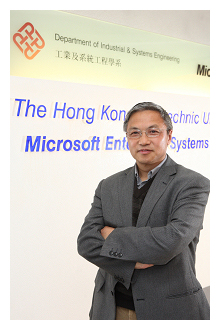|
|
|
|

P. Ji
Professor |
|
Logistics can be defined as supplying customers with the right products to the right place at the right time. Ancient Chinese armies paid much attention to logistics, as we say, "food and fodder should move ahead of an army's deployment". The outcomes of several important battles in Chinese history were directly related to logistics, such as plundering enemy's food and fodder, and burning the counterpart's warehouses. A milestone in ancient China's logistics is invention of the handcart, by Zhuge Liang (181~234 AD), which significantly improved the efficiency of military material movement.
During the Second World War, logistics was greatly recognized by the military, several important logistics techniques were developed and military logistics systems were established since then.
Today's industrial logistics systems use techniques developed from both the old military and the modern computer technology, to improve the efficiency of an enterprise's logistics activities. These industrial logistics systems differentiate themselves from traditional logistics systems with several characteristics:
1) Broader: Due to globalization of the world economy, a logistics manager has to ensure company's products are delivered at the right time both within and outside the company.
2) More information-related: Today's IT (Information Technology) enables a company to transmit information faster and more efficiently than before. However, to use IT effectively, a logistics manager has to adopt and develop a range of Integrating Technologies (IT II), like merging the databases or files of a company and providing the right data via XML to its business partners.
3) More art-oriented: Traditional logistics, as part of the Industrial Engineering discipline, was more like a science, with Operations Research as its foundation. Today's logistics has evolved itself into a conglomerate of both art and science. A logistics manager needs knowledge from both business discipline and engineering discipline, and skills accumulated from his/her experiences.
Today's industrial logistics systems require a logistics manager to get the right information in the right time to make the right decisions. With these characteristics of today's logistics as guides, we designed our Master of Science Programme in Industrial Logistics Systems (ILS) in 2000 and continuously improve the Programme to meet the needs of Hong Kong's dynamic society, and to cultivate our students to become logistics experts with various knowledge.
|
|
Profiles:
| P. Ji (Prof.) |
| BSc (NE Heavy MachineryInst), MSc (Beijing Univ. Aeronautics & Astronautics), PhD (W Virginia) |
| Research Areas: Production Management, Operations Research, CAD/CAM/CIM, Dynamical Systems |
| Room: EF606 |
| Phone: 2766 6631 |
| E-mail: p.ji@polyu.edu.hk |
|
Copyright 2010 All Rights Reserved. Department of Industrial and Systems Engineering, The Hong Kong Polytechnic University.
|
|
